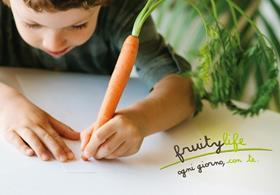
A Mediterranean diet in crisis, Italian children snacking with junk food during breaks, and youngsters increasingly at risk of obesity and unable to recognise fruit and vegetables because they are regularly absent from the dining tables.
These are some of the worrying trends outlined in a report by Ipsos for Save the Children, and highlighted by consumer information and education campaign Fruitylife.
The data outlined a clear trend: in Italy, a greater number of children and adolescents are eating fewer portions of fruit and vegetables, when compared with 2012.
If in 2012, 37 per cent of respondents said they ate fruit and vegetables at every meal, this percentage has decreased to 35 per cent this year, while those who eat fruit and vegetables once a day dropped from 39 per cent to 35 per cent.
On the rise, meanwhile, are those who admit to never eating fruit and vegetables, or those eat them only twice a week, from 25 per cent to 31 per cent.
This supports data from another study, the IDEFICS study published in July 2014 conducted by the European Union on a sample of 16,220 children from two to ten years old, living in Belgium, Cyprus, Estonia, Germany, Hungary, Italy, Spain and Sweden.
This report also demonstrated two alarming facts – Italian children were the most obese and overweight among those examined, while also being the lowest consumers of vegetables in quantities. In Italy, over 20 per cent of children are overweight and 11 per cent are obese.
'Giving children and teenagers seasonal fruit and vegetables helps them to have a healthy, balanced and varied diet,' explained Massimo Brusaporci, director of Alimos-Alimenta la Salute, the cooperative coordinating the Fruitylife 'Fruit and vegetables, healthy and safe' project. 'The many substances contained in these products, as a part of a proper diet, certainly helps everyone to stay healthy, and to cope with stress related to seasonal change.
'Nature is wise and offers us its tasty fruits and its fresh vegetables at the right time for our body,' he continued. 'Consuming these foods, respecting their seasonality, is a way to take care of ourselves. Moreover, fruit and vegetables not only are good for children's health, but also for the parent's wallet. Their prices per kilo are much lower than the typical packaged snacks.'
To assist parents in this food challenge, a recent Memorandum of Understanding signed by 20 Regional Councillors for Agriculture states that vending machines in schools can no longer sell 'junk' food. Fruitylife noted that it was the right time for fruit and vegetables, fresh or dried, purchased from the machine or brought from home, to be eaten during the break to face the school day with the right amount of vitamins, fibers and minerals.
'Fruitylife considers this initiative in line with its campaign to promote the consumption of fruit and vegetables,' noted Brusaporci, 'that is essential for a proper nutrition and an indispensable prerequisite for everyone’s well-being, both children and adults. The Fruitylife project supports the importance of a varied diet and a balanced nutrition, focused on the seasonality of fruit and vegetables.'
Fruitylife is co-funded by the European Union with the Ministry of Agriculture, Food and Forestry Policy, to promote the consumption of European fruit and vegetables, in partnership with five crucial Italian cooperatives in the agri-food sector (Alegra, Apofruit Italy, Conor, Naturitalia and Orogel Fresco).



